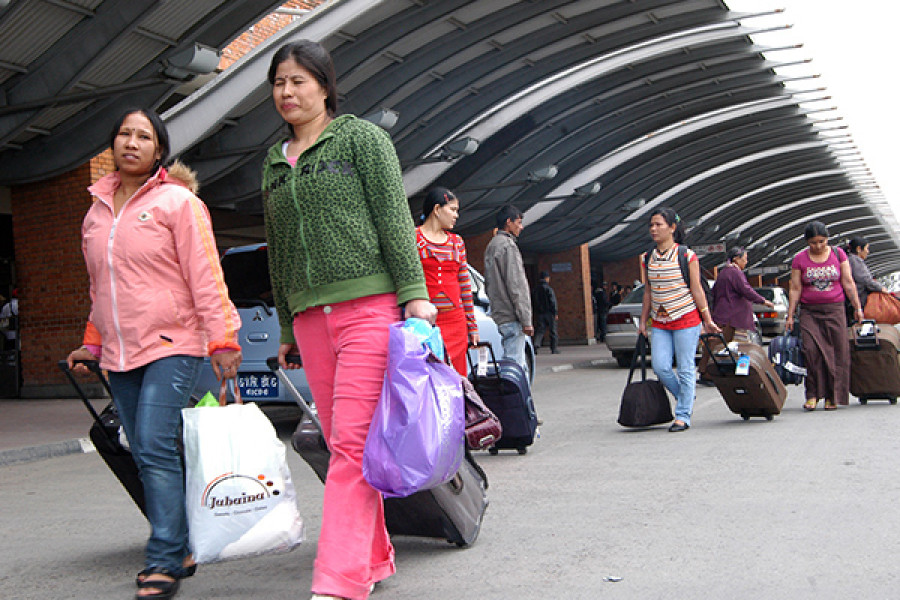Valley
Two years on, Nepali women still barred from working in the Gulf as housemaids
Two years ago, the government imposed a ban on Nepali women taking up jobs as housemaids in the Gulf countries as part of a bid to protect them from potential exploitation.
Chandan Kumar Mandal
Two years ago, the government imposed a ban on Nepali women taking up jobs as housemaids in the Gulf countries as part of a bid to protect them from potential exploitation. But concerns are growing, as rights activists and organisations say such a ban infringes upon an individual’s right to mobility. The government, nonetheless, seems to be in a dilemma as to what it should do.
The ban was enforced as instructed by members of the parliamentary International Relations and Labour Committee, who had made a 10-day visit to the Gulf countries in April 2017 to take stock of the working conditions and other aspects.
In its report submitted in August 2017, the committee also justified banning the migration of Nepali women to work in those countries.
“The ban is an example of the struggle between protecting individuals’ right to mobility and the state’s duty to protect its citizens,” an official at the Ministry of Labour, Employment and Social Security told the Post on condition of anonymity because the official was not allowed to speak on this matter.
The Labour Ministry has taken initiatives in the last few months to discuss the pros and cons of imposing such a ban on women, to no avail. There have been meetings with members of the International Relations Committee of Parliament as well.
“We have discussed the matter at the committee a few times. Since the ban was enforced as per the directive from the parliamentary committee, the ministry cannot do anything. If a clear instruction comes from the committee, we can reconsider it,” the official added.
Since the introduction of the ban, rights activists and organisations have slammed the government for taking such a “restrictive approach”, saying that it curtails women’s right to movement and employment.UN Special Rapporteur on the human rights of migrants Felipe Gonzalez Morales, who visited Nepal last year, had said that the restriction on women, who were migrating for jobs abroad, was discriminatory and inconsistent with international law.
The 71st Session of the Committee on the Elimination of Discrimination Against Women (CEDAW), which praised Nepal’s efforts in signing labour agreements with many destination countries for protection of its citizens, however, raised concerns about restriction on the freedom of movement that only exposes women to discriminatory practices like physical abuse and sexual assault, forced labour and unequal pay.The CEDAW, in its recommendations, said the Nepal government should protect labour rights and promote safe and secure working environment for all workers, including migrants, particularly women opting for foreign employment.It further urged the government to guarantee all women equal access to employment within and outside the country by repealing the discriminatory restrictions imposed on those trying to work abroad.
Roshana Pradhan, a lawyer and programme officer with the Forum for Women, Law and Development, told the Post that international community criticising the ‘protectionist approach’ has mounted pressure on the government to reconsider the ban.
“The government defends itself saying that if the protectionist approach was not introduced then these women workers would have become victims of exploitation and human trafficking. However, by doing so they have rather made them vulnerable, as they migrate through illegal channels,” said Pradhan.“On international platforms, the government says it is committed to protecting women’s rights. Here, it has blocked the right to mobility of an adult. If a male citizen can migrate to countries of their choice why can’t a woman?”
Historically, migration of Nepali workers mainly to the Gulf countries and Malaysia has been male-dominated.
According to the statistics at the Department of Foreign Employment, while men received approximately 96 percent of the labour permits issued between 2008 and 2015, the number of women getting the permits to work abroad shot up 2.5 times over the same period.
After reports of exploitation of Nepalis who had taken up domestic jobs at the hand of their employers mainly in the Gulf, the ban was imposed on women choosing to work as domestic help, fearing that these workers may be subjected to physical and psychological abuse.
The ban, however, has not yielded the desired result to a great extent—the fact also accepted by government officials—as they have taken illegal routes to reach the Gulf countries and often fall victim to human trafficking.The restrictive approach has led to further exploitation of these workers, according to Bijaya Rai Shrestha, chairperson of the Aprabasi Mahila Kamdar Samuha.
“The blanket ban on domestic helps was brought with a good intention. But has it improved anything? It has not. In reality, women workers are still falling prey to human trafficking rackets,” said Shrestha. “This is also an example of gender-based discrimination as it affects female workers the most and denies them their right to mobility and better opportunities.”
There have been incidents of Nepali women using Indian airports and new routes.In February, as many as 183 Nepali citizens were rescued from the Indian state of Manipur while trying to cross the Indo-Myanmar border before they would be trafficked to the Gulf and other Southeastern countries.In recent labour agreements with Oman and the United Arab Emirates, the government has prioritised special arrangements to protect vulnerable groups especially Nepali female migrant workers to protect them from human trafficking, illegal recruitment, and forced labour.
“The cases of women using illegal routes to reach these countries have not completely stopped. However, the number of women migrating has definitely gone down,” the labour ministry official added.“We need a clear policy on this. If the women cannot take up risky jobs like housemaid, they can be allowed to do other household jobs like gardener and driver, which makes them less vulnerable.”




 20.12°C Kathmandu
20.12°C Kathmandu













